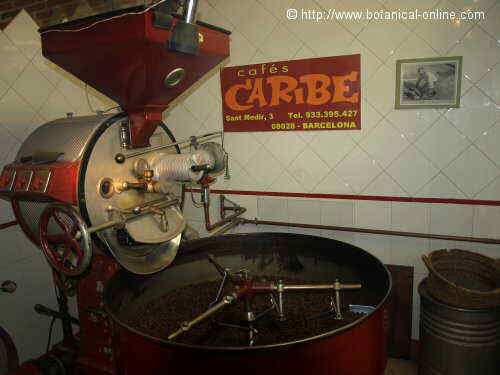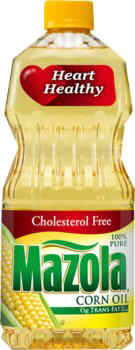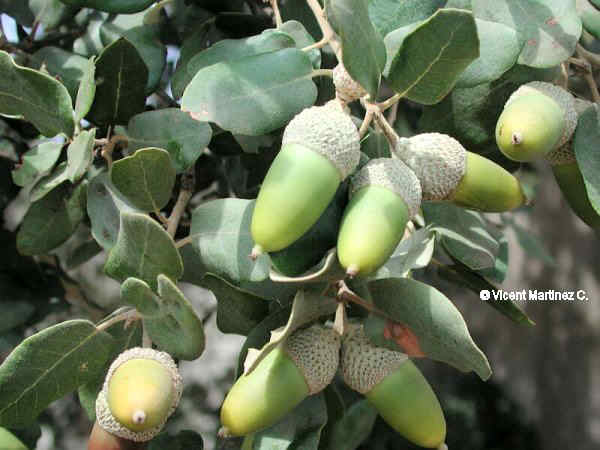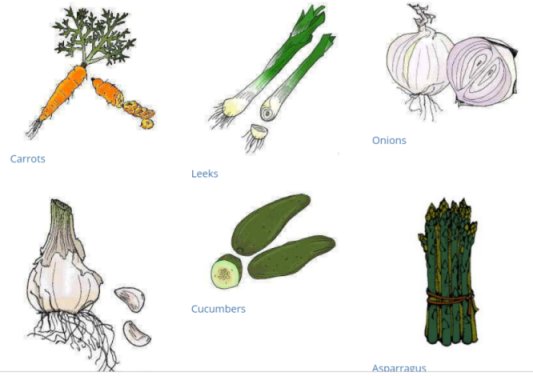Contents
Medicinal uses of broccoli
Health benefits of broccoli
BROCCOLI is a vegetable of the Cruciferae family, related to cauliflower, cabbage and turnips.
It is rich in vitamins and minerals such as vitamin A as beta carotene, vitamin C, phosphorus, magnesium, calcium, folic acid and potassium.
Compared with other foods from the cabbage family, broccoli has a composition similar to Brussels sprouts. The latter are more calories and with a slightly higher mineralization.
In comparison with other Brassicaceae, such as cauliflower or cabbage, broccoli has more vitamins and mineral wealth.
It possesses slightly more calories because it contains more fats and carbohydrates.
But broccoli is mostly known for its wealth in phytochemicals that make it a very important food-medicine.
This page shows us the main properties of this vegetable food.
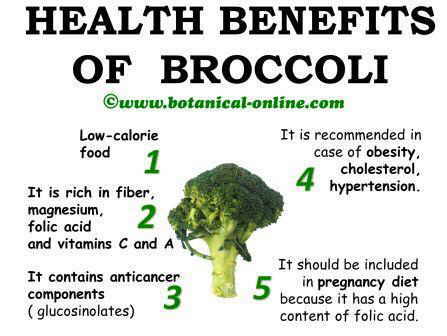
Summary of the main medicinal properties of broccoli
BROCCOLI AS A MEDICINAL FOOD
Broccoli is the vegetable with the highest anticancer properties
According to numerous studies by the National Cancer Institute in the United States, broccoli is the vegetable with the highest power to defend us against cancer. These properties are due to a number of components which are very abundant, such as glucosinolates, vitamin A and vitamin C.
Glucosinolates are compounds produced by certain plants to protect themselves from ruminants. Although these compounds are toxic to animals, they can be extremely beneficial to the human body.
The body breaks down the glucosinolates into indole glucosinolates (isothiocyanates). Indoles are involved in the regulation of estrogen and help prevent breast cancer. Scientific studies show that eating cruciferous vegetables frequently protects against various cancers, including lung cancer, stomach, colon, rectum and prostate.
Beta-carotene is converted into vitamin A in our body. It exerts an antioxidant function, being able to prevent many degenerative diseases, including cancer. Broccoli is rich in betacarotenes.
Vitamin C is another potent antioxidant, which is also involved in cancer prevention. It should nevertheless be borne in mind that much of the vitamin C can be lost in the cooking process. (Up to 60% of vitamin C can be lost if boiled and 20% when steamed)
Broccoli Protects Against Heart Disease
Broccoli is rich in folate (vitamin B9) of vital importance to the human body.
Among its many functions we can point out the prevention of defective fetus development, proper iron absorption, the prevention of heart disease or the maintenance of good mental and emotional state.
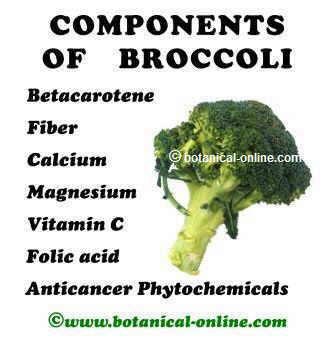
Medicinal components of broccoli
Broccoli for anemia
Broccoli contains 1.20 mg. of iron per 100 g. Although there are more iron-rich foods, this vegetable is very rich in iron and should be introduced in the diet for anemia.
Broccoli helps fight or prevent anemia because it is rich in vitamin C (which increases iron absorption) as well as contains iron and folic acid, another vitamin involved in the treatment of some types of anemia.
Broccoli should enter into the usual diet of people who may have an easier time developing this disease (anemia, pregnant or nursing women, women with heavy menstruation, people who regularly bleed from the nose, etc.)
Digestive properties of broccoli
This vegetable contains abundant amounts of other vitamins of group B. Including, for example, pyridoxine (vitamin B6) that is necessary for the formation of certain enzymes, such as pepsin, that helps break up food promoting digestion.
Eating broccoli may help resolve problems that cause indigestion, flatulence or other negative digestive symptoms.
Broccoli for nerves and depression
Folic acid is needed along with cobalamin to produce dopamine that gives us a sense of well being and prevents being depressed.
Broccoli also contains calcium and magnesium. This minerals are important in the regulation of sleep cycles. Eating foods containing these minerals will help people with insomnia to prevent it.
Broccoli is rich in magnesium, which is considered a natural muscle relaxer. This mineral is necessary for the nerves and muscles to work properly. It regulates the heartbeat, provides energy to the muscles, promotes blood flow and it is involved with calcium in the formation of bones and teeth.
Regular inclusion in the diet can be useful for the prevention of stress, cardiac arrhythmias or arteriosclerosis.
It also participates in basic bodily functions, among others, for example, protein synthesis, metabolism of carbohydrates and cell renewal. For these reasons, broccoli intake increases the feeling of vitality.
On the other hand, the regeneration of mucosal cells of the body generally allows greater protection against invasion of bacteria or viruses. The regeneration of the intestinal mucous helps improve the digestive process and protects the body against many infections.
Broccoli to treat fluid retention and arthritis
Broccoli is rich in potassium. This mineral is very helpful to balance the high sodium content of this vegetable. By doing this, it can regulate the level of fluids in the body. Eating broccoli can help prevent fluid retention, so it is appropriate in cases of edema, obesity or hypertension.
The ability to remove serous accumulations in the joints, along with its wealth of glutathione makes it an ideal food in the diet of people with arthritis. There is evidence that people with low levels of glutathione in the body are more likely to develop this disease.
Broccoli is rich in calcium
Broccoli contains plenty of calcium, whose role in bone formation is so important to prevent the onset of osteoporosis.
It is usually important to include this food in the diet of those who may be more prone to decalcification. It is recommended for aging people because they have more difficulty absorbing this mineral, menopausal women, growing children, and for people who smoke or drink plenty of alcohol, since they interfere with calcium absorption.
A very detoxifying and antiinfective vegetable
The antioxidant properties of broccoli are suitable not only for cancer prevention but also for detoxification our body in general.
Eating broccoli stimulates the activity of the liver purifying the blood from toxins that can affect the body’s overall health. This improvement is manifested outwardly in the state of the skin. The regenerative properties of broccoli clearly show how healthy we really are.
Including two or three weekly servings of broccoli will help our skin, nails and hair to look healthier and get to avoid or reduce the symptoms of many diseases that affect our skin such as dryness, acne, wrinkles, hair loss, etc.
The ability of broccoli to prevent infections is due to a number of components that enhance the immune system . Among these, vitamin C and vitamin A are the most valuable. Many infections of the digestive or respiratory tract can usually be prevented by eating broccoli.
Broccoli can combat hyperthyroidism
Brassicas such as broccoli, cabbage, cauliflower, turnips, radishes, mustard greens or sprouts have the ability to decrease thyroid hormone.
Therefore, eating these foods may be appropriate in the treatment of hyperthyroidism.
Broccoli is a suitable food for constipation and weight loss diets
The high fiber content of broccoli makes it very useful to stimulate bowel movements, preventing constipation.
Its fiber content will also contribute to the same effect. Increasing defecation will help remove toxins from the intestines and will create the feeling of satiety that helps us stay longer without eating other caloric foods.
Because of its fiber content, its low calorie content (almost 90% of water) its low fat content, and its high level of potassium broccoli is a very interesting vegetable when dieting.
Do not forget that broccoli contains complex carbohydrates, which provide blood sugar in a gradual manner so they can help keep energy levels constant, decreasing the need for more food.
COMPOSITION OF BROCCOLI PER 100G
| Per 100g. | BROCCOLI Raw | BROCCOLI Cooked, strained, no salt |
| Water (g.) | 89,3 | 88,9 |
| Calories (Kcal.) | 34 | 36 |
| Fat (g.) | 0,37 | 0,5 |
| Protein (g.) | 2,82 | 2,55 |
| Carbohydrates (g.) | 6,64 | 7,1 |
| Fiber (g.) | 2,6 | 2,6 |
| Potassium (mg.) | 316 | 317 |
| Phosphorus (mg.) | 66 | 56 |
| Iron (mg.) | 0,73 | 1,2 |
| Sodium (mg.) | 33 | 21 |
| Magnesium (mg.) | 21 | 20 |
| Calcium (mg.) | 47 | 36 |
| Vitamin C (mg.) | 89 | 62 |
| Vitamin A (UI.) | 623 | 775 |
| Vitamin E (mg.) | 0,78 | 0,43 |
| Folic acid (mcg.) | 63 | 60 |
| Thiamin (mg.) | 0,071 | 0,11 |
| Riboflavin (mg.) | 0, 12 | 0,08 |
| Niacin (mg.) | 0, 64 | 0, 61 |
| Pantothenic acid (mg.) | 0, 57 | 0, 25 |
| Pyridoxine (mg.) | 0, 18 | 0,18 |
| Copper (mg.) | 0,05 | 0,08 |
| Zinc (mg.) | 0,41 | 0,33 |
| Manganese (mcg.) | 0,21 | 0,23 |
| Per 100g: | Brussels sprouts | Cauliflower | Cabbage |
| Water (g.) | 86 | 91,91 | 92,15 |
| Calories (Kcal.) | 43 | 25 | 25 |
| Fat (g.) | 0, 3 | 0, 21 | 0, 27 |
| Protein (g.) | 3,38 | 1,98 | 1,44 |
| Carbohydrates (g.) | 8,96 | 5,2 | 5,43 |
| Fiber (g.) | 3,8 | 2,5 | 2,3 |
| Potassium (mg.) | 389 | 303 | 246 |
| Phosphorus (mg.) | 69 | 44 | 23 |
| Iron (mg.) | 1,4 | 0,44 | 0,59 |
| Sodium (mg.) | 25 | 30 | 18 |
| Magnesium (mg.) | 23 | 15 | 15 |
| Calcium (mg.) | 42 | 22 | 47 |
| Vitamin C (mg.) | 85 | 46,4 | 32,2 |
| Vitamin A (UI.) | 883 | 19 | 133 |
| Vitamin E (mg.) | 0,88 | 0,04 | 0,11 |
| Folic acid (mcg.) | 61 | 57 | 43 |
| Thiamin (mg.) | 0,14 | 0,06 | 0,05 |
| Riboflavin (mg.) | 0,09 | 0,06 | 0,04 |
| Niacin (mg.) | 0, 75 | 0, 53 | 0, 3 |
| Pantothenic acid (mg.) | 0, 09 | 0,7 | 0,21 |
| Pyridoxine (mg.) | 0,31 | 0,22 | 0,1 |
| Copper (mg.) | 0,07 | 0,04 | 0,02 |
| Zinc (mg.) | 0,42 | 0,28 | 0,4 |
| Manganese (mcg.) | 0,42 | 0,16 | 0,22 |
![]() More information about BROCCOLI
More information about BROCCOLI




